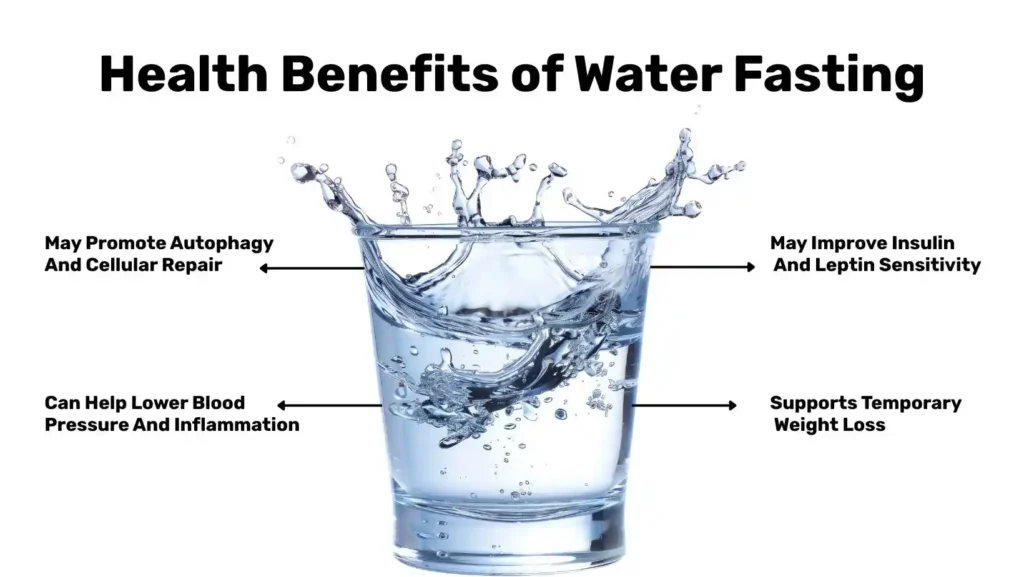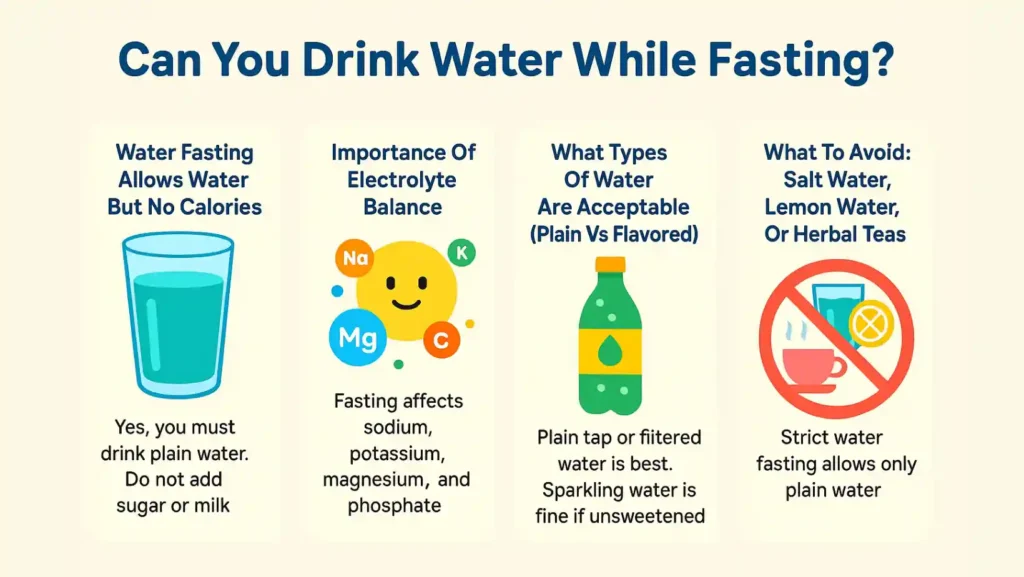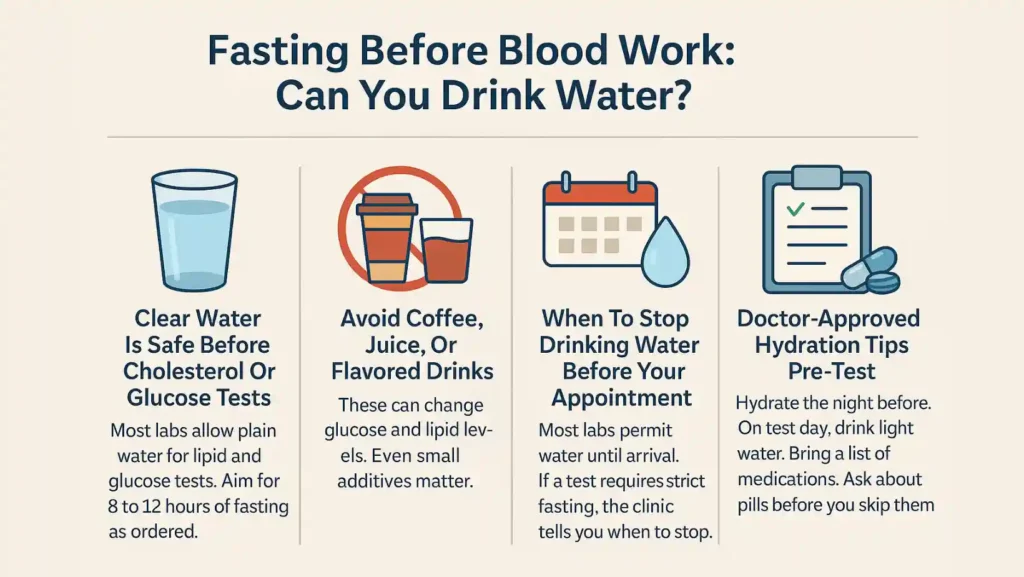Water fasting means you drink only water and eat no food. You feel changes fast. Your body shifts fuel from sugar to fat. Short fasts can be safe for healthy people. Longer fasts raise real risks. You must know when to stop and how to refeed safely.
Table of Contents
ToggleWhat Is Water Fasting?
Water fasting is a practice where you consume only plain water. No calories, no tea, and no coffee with milk. People do it for weight loss, spiritual reasons, or before medical tests. The most common fasts last one to three days. Longer fasts need medical supervision.
How Water Fasting Works in the Body?
When you stop eating, your body first uses stored sugar called glycogen. After glycogen runs low, your body burns fat and makes ketones. Cells may begin cellular cleanup, a process linked to autophagy (cells breaking down damaged parts). This process appears in lab and animal studies, and some human research supports it.
Typical Duration (24 Hours To 3 Days)
Most casual fasts run from 24 to 72 hours. One day fasts are common and low risk for healthy adults. Three-day fasts increase the chance of dizziness and low electrolytes. Anything beyond three days needs clinical oversight and labs.
Water Fasting Vs Intermittent Fasting
Intermittent fasting limits when you eat each day. For example, you might fast 16 hours and eat in an eight-hour window. Water fasting removes food and calories completely for a set time. Intermittent fasting is easier to stick to and is safer for long-term weight control.
Medical And Religious Reasons For Fasting
You may fast for religious rites or for medical prep before tests. Some clinical trials use short fasts to study metabolism. Hospitals sometimes use carefully controlled fasting before surgery. For any medical reason, follow expert instructions.
How to Do Water Fasting Safely
Prepare Your Body With Smaller Meals Before Fasting
Reduce heavy meals two to three days before the fast. Eat smaller portions and avoid processed foods. This lowers digestive stress and reduces nausea when you refeed.
Stay Hydrated With Clean, Filtered Water
Drink plain, filtered water throughout the day. Do not add sugars or alcohol. Check urine color; pale means good hydration. Dark urine means you need more fluids.
Avoid Strenuous Physical Activity
Drop high-intensity workouts. Fasted heavy exercise raises fainting risk. Gentle walking and stretching are fine if you feel stable.
Break The Fast Gradually With Light Foods
Start refeeding with broth, diluted fruit, or soft fruit. Add lean protein and vegetables over two to three days. Go slow to avoid nausea and bloating. Refeeding after long fasts must be gradual to avoid dangerous shifts in electrolytes.
Always Consult A Doctor Before Prolonged Fasting
If you take medicine, have a chronic illness, are pregnant, or are underweight, see your clinician. They can advise on testing, monitoring, and safe refeeding steps.
Potential Health Benefits of Water Fasting
May Promote Autophagy And Cellular Repair
Short-term food restriction can stimulate autophagy. This helps cells recycle damaged parts. The strongest evidence comes from lab work and animal studies. Human data are growing, but not yet conclusive.
Can Help Lower Blood Pressure And Inflammation
Studies show blood pressure often drops during prolonged fasts. Some inflammatory markers decrease, too. However, the effects can reverse once normal eating resumes. Monitor blood pressure closely during multi-day fasts.
May Improve Insulin And Leptin Sensitivity
You can see lower blood sugar and better insulin response after short fasts. This effect tends to be temporary. Long-term benefit needs lifestyle change beyond one fast.
Supports Temporary Weight Loss
Weight falls quickly at first because glycogen and water leave your body. Fat loss follows if you keep calories low afterward. Much early weight loss is not fat.
May Reduce The Risk Of Certain Chronic Diseases
Some markers linked to heart disease may improve with fasting. Still, long-term prevention of disease needs steady healthy habits, not repeated long fasts.
Water Fasting For Weight Loss — Facts Vs Myths
Why Initial Weight Loss Is Mostly Water, Not Fat
Your body stores glycogen with water. When glycogen drops, water leaves too. This gives quick weight loss that is mostly water, not fat.
Metabolic Slowdown After Long Fasts
Extended fasting lowers your resting energy use. Your body conserves fuel. This can make losing weight harder long-term.
How Refeeding Affects Long-Term Results
If you return to old eating habits, weight comes back fast. Slow, realistic diet changes are better for lasting results.
Safer Alternatives: Calorie-Restricted Diets
Daily calorie cuts and balanced meals reduce risk. Time-restricted eating and the 16:8 plan can be effective and safer than prolonged water fasting.
Can You Drink Water While Fasting?
Water Fasting Allows Water But No Calories
Yes, you must drink plain water. Do not add sugar or milk. Water keeps you hydrated and makes blood draws easier.
Importance Of Electrolyte Balance
Fasting affects sodium, potassium, magnesium, and phosphate. Low levels can cause weakness or abnormal heart rhythms. Monitor electrolytes for multi-day fasts.
What Types Of Water Are Acceptable (Plain Vs Flavored)
Plain tap or filtered water is best. Sparkling water is fine if unsweetened. Avoid flavored waters with sugars or calories.
What To Avoid: Salt Water, Lemon Water, Or Herbal Teas
Strict water fasting allows only plain water. Lemon water, herbal teas, or salty drinks may break a strict fast. If your goal is strict fasting, stick to plain water.
Can I Drink Water Before A Fasting Blood Test?
Yes — Water Doesn’t Affect Most Test Results
For many lab tests, clear water is allowed. Water often improves blood draw accuracy by making veins easier to find. Follow lab instructions carefully.
Why Hydration Improves Blood Draw Accuracy
Hydration plumps veins and eases needle access. This reduces failed draws and the need for repeat tests.
Exceptions: Specific Tests Needing Full Fasting
Some procedures require no water. If instructed to be NPO after midnight, follow that rule exactly.
How Much Water You Can Drink Before Testing
- Sip normal amounts.
- Do not chug huge volumes.
- Labs usually allow you to drink water up to arrival.
Fasting Before Blood Work — Can You Drink Water?
Clear Water Is Safe Before Cholesterol Or Glucose Tests
Most labs allow plain water for lipid and glucose tests. Aim for 8 to 12 hours of fasting as ordered.
Avoid Coffee, Juice, Or Flavored Drinks
These can change glucose and lipid levels. Even small additives matter.
When To Stop Drinking Water Before Your Appointment
Most labs permit water until arrival. If a test requires strict fasting, the clinic tells you when to stop.
Doctor-Approved Hydration Tips Pre-Test
Hydrate the night before. On test day, drink light water. Bring a list of medications. Ask about pills before you skip them.
Signs To Stop Water Fasting Immediately
Dizziness Or Lightheadedness
If you feel faint or dizzy, stop fasting and sit. Drink water and get help if you do not improve.
Nausea, Fatigue, Or Brain Fog
Severe brain fog or ongoing nausea is a red flag. End the fast and seek medical advice.
Irregular Heartbeat Or Sharp Drop In Blood Pressure
Palpitations or passing out need urgent care.
Dehydration Symptoms: Dark Urine Or Dry Mouth
Dark urine, very dry mouth, and weak pulses mean you must stop and rehydrate.
Worsening Of Pre-Existing Medical Conditions
If a chronic condition worsens, stop immediately and call your clinician.
(If you see signs to stop water fasting, act fast. These signs can become emergencies.)
Who Should Avoid Water Fasting
People With Diabetes, Eating Disorders, Or Heart Disease
Diabetes can cause dangerous low blood sugar. Eating disorders can get worse. Heart disease can make fasting risky. Avoid unsupervised fasts.
Pregnant Or Breastfeeding Women
You must not fast long-term while pregnant or breastfeeding. The baby needs steady nutrients.
Those Taking Prescription Medications
Many drugs need food or a steady intake. Check with your prescriber before fasting.
Children, the Elderly, Or Underweight Individuals
These groups require steady nutrition for growth and health. Fasting raises real danger.
Dangers And Risks Of Water Fasting
Nutrient Deficiency And Muscle Loss
Long fasts can break down muscle and cause a vitamin shortage. Studies show prolonged water-only fasts result in a lot of lean mass. This is a major downside.
Low Blood Sugar Or Fainting Risk
Hypoglycemia can cause fainting, confusion, and seizures, especially if you are diabetic.
Refeeding Syndrome After Extended Fasts
Refeeding syndrome can cause sudden electrolyte shifts that harm the heart and nerves. Refeeding must be cautious after long fasts.
Long-Term Hormonal Disruption From Chronic Fasting
Lots of long fasts can alter thyroid, reproductive hormones, and stress hormones. This can harm mood and fertility.
How To Refeed Safely After Water Fasting
Start With Soft, Low-Fat Foods Like Fruits Or Soups
Begin with small portions of broth, fruit, or plain yogurt. Wait between bites.
Avoid Overeating To Prevent Bloating Or Nausea
Small meals prevent pain and nausea. Give your stomach time to restart.
Add Fiber, Protein, And Probiotics Gradually
Add vegetables, lean meat, and yogurt slowly. Spread this over two to three days.
Resume Normal Eating Over 2–3 Days
For short fasts, you may go back to normal in two days. Longer fasts need slower refeeding and medical checks.
Alternatives To Water Fasting
Intermittent Fasting (16:8 Method)
You fast daily for 16 hours and eat in an eight-hour window. This is simpler and safer for many people.
Time-Restricted Eating Or Alternate-Day Fasting
These approaches lower calories while still allowing some food on eating days.
Juice Fasting Vs Water-Only Fasting
Juice gives calories and some nutrients. It lowers refeeding risks but raises sugar intake.
Medical Fasting Under Professional Supervision
Clinically supervised fasting is the safest way to fast for many days. Hospitals can monitor electrolytes and vitals.
FAQs
What is water fasting and how does it work?
Water fasting means drinking only plain water while your body switches from glycogen to fat and makes ketones for energy, which can trigger cell-cleanup processes like autophagy.
Can you drink water while fasting?
Yes. You can drink water while fasting. Plain water is allowed and recommended for most fasting goals, to avoid dehydration and to ease blood draws for tests.
How long can you safely water fast?
Most healthy people can fast for 24 to 72 hours safely, but longer fasts need medical supervision, blood tests, and electrolyte checks before continuing.
Is water fasting good for detox or weight loss?
Short fasts give quick weight loss, mainly water and glycogen. Claims about detox are not proven. Sustainable diets yield better long-term results.
Can I drink water before a fasting blood test?
Yes. You can drink water before a fasting blood test. Plain water is allowed and often advised because it improves blood draw success and accuracy.
Can fasting help lower blood sugar naturally?
Short fasts lower blood sugar temporarily. For diabetes, you must not fast without medical guidance because risks include severe hypoglycemia.
What are the signs I should stop fasting?
If you feel faint, dizzy, have chest pain, severe nausea, confusion, or signs to stop water fasting, stop immediately and seek medical help.
Can fasting cause low blood pressure or dizziness?
Yes. Dehydration and electrolyte loss can trigger low blood pressure, dizziness, and fainting, especially during multi-day fasts.
Is water fasting safe for diabetics?
No. Diabetics should not do unsupervised water fasting. Risks include dangerously low blood sugar and diabetic ketoacidosis.
How much water should I drink during fasting?
Sip water throughout the day. Aim to drink enough so your urine is pale. Avoid overdrinking to the point of bloating.
Is lemon water allowed during fasting?
Strict water fasting forbids lemon or additives. Small lemon slices can change insulin and break a strict fast.
What happens to the body after a 3-day fast?
After three days, glycogen is nearly gone, ketones rise, autophagy signals increase, and electrolyte risk grows, so monitor closely.
Can fasting affect metabolism long-term?
Repeated long fasts can slow metabolism and alter hormones, harming weight control and reproductive health.
Should I take electrolytes while water fasting?
For multi-day fasts, clinicians may recommend careful electrolyte support. Do not self-prescribe electrolytes without testing.

This article is medically reviewed by Dr. Nivedita Pandey, Senior Gastroenterologist and Hepatologist, ensuring accurate and reliable health information.
Dr. Nivedita Pandey is a U.S.-trained gastroenterologist specializing in pre and post-liver transplant care, as well as managing chronic gastrointestinal disorders. Known for her compassionate and patient-centered approach, Dr. Pandey is dedicated to delivering the highest quality of care to each patient.











